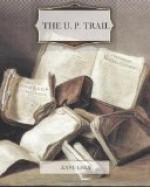Wherever the work-trains stopped there began a hum like a bee-hive. Gangs loaded rails on a flat-car, and the horses or mules were driven at a gallop to the front. There two men grasped the end of a rail and began to slide it off. In couples, other laborers of that particular gang laid hold, and when they had it off the car they ran away with it to drop it in place. While they were doing this other gangs followed with more rails. Four rails laid to the minute! When one of the cars was empty it was tipped off the track to make room for the next one. And as that next one passed the first was levered back again on the rails to return for another load.
Four rails down to the minute! It was Herculean toil. The men who fitted the rails were cursed the most frequently, because they took time, a few seconds, when there was no time.
Then the spikers! These brawny, half-naked, sweaty giants—what a grand spanging music of labor rang from under their hammers! Three strokes to a spike for most spikers! Only two strokes for such as Casey or Neale! Ten spikes to a rail—four hundred rails to a mile! ... How many million times had brawny arms swung and sledges clanged!
Forward every day the work-trains crept westward, closer and closer to that great hour when they would meet the work-trains coming east.
The momentum now of the road-laying was tremendous. The spirit that nothing could stop had become embodied in a scientific army of toilers, a mass, a machine, ponderous, irresistible, moving on to the meeting of the rails.
Every day the criss-cross of ties lengthened out along the winding road-bed, and the lines of glistening rails kept pace with them. The sun beat down hot—the dust flew in sheets and puffs—the smoky veils floated up from the desert. Red-shirted toilers, blue-shirted toilers, half-naked toilers, sweat and bled, and laughed grimly, and sucked at their pipes, and bent their broad backs. The pace had quickened to the limit of human endurance. Fury of sound filled the air. Its rhythmical pace was the mighty gathering impetus of a last heave, a last swing.
Promontory Point was the place destined to be famous as the meeting of the rails.
On that summer day in 1869, which was to complete the work, special trains arrived from west and east. The Governor of California, who was also president of the western end of the line, met the Vice-President of the United States and the directors of the Union Pacific. Mormons from Utah were there in force. The Government was represented by officers and soldiers in uniform; and these, with their military band, lent the familiar martial air to the last scene of the great enterprise. Here mingled the Irish and Negro laborers from the east with the Chinese and Mexican from the west. Then the eastern paddies laid the last rails on one end, while the western coolies laid those on the other. The rails joined. Spikes were driven, until the last one remained.




